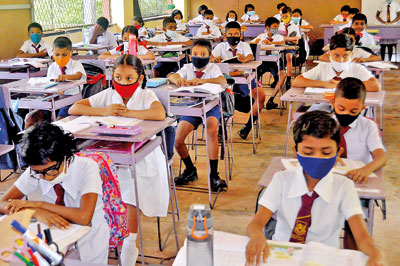News
Some provincial schools throwing caution to the winds, charge unions
Teachers in some provincial schools have been summoned even when there was no work while other schools were teaching multiple grades and holding parent-teacher meetings despite the Government shutting down educational institutions again this week, General Secretary of the Ceylon Teachers’ Union Joseph Stalin said.

School in Minuwangoda: Following primary precautions such as wearing masks and keeping social distance. Pix by Priyanthe Wickramaarachchi
Education Ministry orders were being openly flouted in the quest for better examination results for their individual schools, another unionist claimed. Some principals wanted all their teachers to be at work while others asked all students to be present when the Government had directed only those in Grade 5, 11 and 13 to come.
There was no point in the Education Ministry issuing a circular if it wasn’t enforced,” Mr Stalin said. His union had tried to alert authorities when guidelines were broken but the violators weren’t even reprimanded.
The guidelines were even relaxed to allow masks to be removed inside schools. To ignore the remaining few rules would be to risk the lives of more than four million children, he claimed. As for temperature checks at the school gates, prominent schools like Royal College and Visakha Vidyalaya have them in place. But many lesser known institutions have not put in place such precautions.
This could be linked to affordability. “But it also points to clear discrimination,” Mr Stalin said. There is a problem here, he added. Special programmes and mechanism were pointless if they are not enforced.
The Principals’ Association of Sri Lanka had also received reports of members breaching the Education Ministry health guidelines, its President Mohan Weerasinghe said. The majority of principals, however, were under the authority of Zonal Education Offices. He denounced the violations and called for stricter enforcement.
The absence of “primary precautions” like masks and temperature checks made no sense, he held. Government offices employing thousands of people have those measures in place. “Why, then, don’t our schools have them?” he asked.
Education leaders like principals and zonal directors need not be told “again and again” to follow simple guidelines, Mr Weerasinghe stressed: “Their exam-results-driven behaviour has made matters worse and children and teachers are paying the price.”
A student of Rajanganaya Track 01 Vidyalaya tested positive for COVID-19 while a teacher from Saralankara Vidyalaya, Galle, was quarantined after they came into contact with staff at Kandakadu Drug Rehabilitation Camp.
“It was found that the principal of Rajanganaya Track 01 Vidyalaya had asked students of all classes to report to school,” Mr Stalin said, explaining the risk. This is despite the Education Ministry having instructed only Grade 5, 11 and 13 to return. Separately, the principal of Saralankara Vidyalaya had directed all teachers to report to work despite the Ministry having said only relevant instructors are required to be present.
“Had the principals followed orders, the infected people would not have come to school,” Mr Stalin said.
The Education Ministry issued instructions before the staggered opening of schools starting July 6. In the first stage–from July 6 to 17–only teachers with class timetables and duties such as management, disciplinary and health activities were to report.
Principals were also asked not to call teachers who have no duties or teaching timetables during the first and second stage (July 20-24). Teachers who were required to be present must report at 7.30 am and be allowed to leave when the allocated tasks were done.
However, there was confusion in some areas such as the Gampaha District where the Zonal Education Office issued a notice with conflicting instructions for principals. It said all teachers must come to school.
The purpose was to inform principals that teachers who had duties beyond immediate academic responsibilities should be summoned,” clarified Gampaha Zonal Education Director of Gampaha S K Mallawarachchi. “A teacher’s work is not limited to teaching now. There are other responsibilities like dengue and Covid-19 prevention programmes, so on.”
There was enough work in schools, necessitating all teachers to be present. “However, if there is a teacher who has nothing to do after all those duties are taken care of and he or she has no reason to be called in, we are fine with that,” he said.
Union claims of insubordination by Zonal Officers were false, rejected Education Ministry Secretary N H M Chithrananda. The Ministry and Provincial Councils were cooperating. But the Ministry did not wish to meddle with the finer administration of schools at the grassroots level as these were under the Provincial Councils. There would be no punishment for principals under current circumstances, he said.

